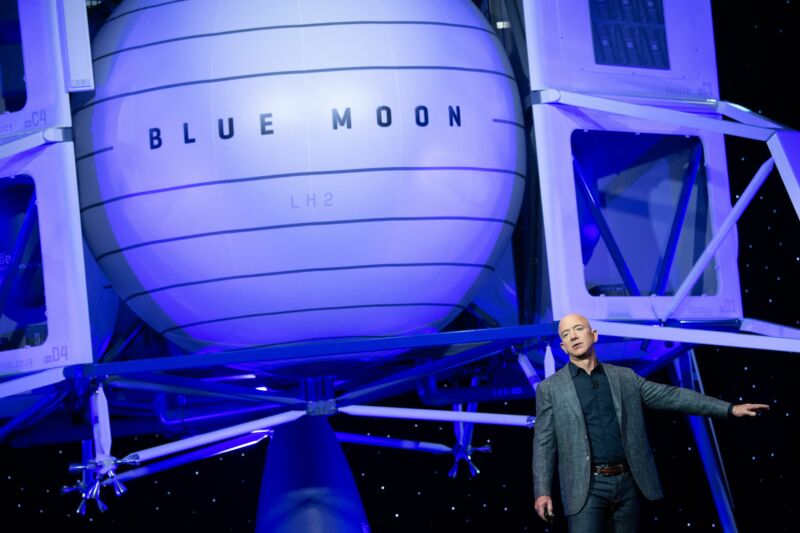
By as early as the fall of 2016, Amazon founder Jeff Bezos had already started to worry deeply about the progress—or lack thereof—being made by his rocket company, Blue Origin.
Although the business had begun to successfully launch its suborbital vehicle, New Shepard, Bezos watched with increasing envy as SpaceX landed its much larger Falcon 9 rocket on ocean-based drone ships. He saw, too, this surging new-space competitor winning launch contract after contract from NASA and the US Department of Defense.
And so, in response, Bezos invited a succession of executives from Blue Origin to his office in Seattle for one-on-one lunches. During these meetings, the executives complained about poor internal communication, long meetings, and questionable spending decisions. One engineer described the company as a Potemkin village—with a dysfunctional culture concealed beneath an industrious façade.
This anecdote is recounted in Amazon Unbound, a new book about the rise of Bezos and Amazon over the last decade. Authored by Brad Stone, the book is being published today, and much of the narrative deals with Bezos' much more valuable retail business. But there is a chapter devoted to Blue Origin that reveals a business in distress.
After the fall 2016 meetings, Bezos informed company President Rob Meyerson that he would hire a chief executive officer for Blue Origin for the first time. According to Stone's book, this process included an inquiry to SpaceX's president and chief operating officer, Gwynne Shotwell. Shotwell, who had worked for SpaceX almost from the beginning of its founding in 2002, quickly turned down the opportunity. (A source confirmed this to Ars.)
Following a yearlong search, Bezos selected Bob Smith, a senior manager at Honeywell Aerospace. Smith was hired to lead Blue Origin through a transition from its startup phase, with just a few hundred employees, to become a major player in the space business. Most of all, Bezos wanted to start winning government contracts like SpaceX.
ULA dispute
The book also delves into the 2014 decision by United Launch Alliance to purchase BE-4 rocket engines from Blue Origin for its Vulcan rocket. Significant fallout ensued a few years later when Blue Origin announced its plans to build the large New Glenn rocket that would compete with Vulcan.
"Executives from the two companies stopped talking; tensions were so high that they walked past one another in the halls of the annual Space Symposium that year without acknowledging one another," Stone writes. "Blue later disputed the notion that its execs stopped talking to counterparts at ULA. Nevertheless, the story ULA execs eventually heard from employees at Blue... was that Bezos was frustrated that the government was funding Elon Musk’s space dreams and wanted to get in on the action."
At the time, Bezos was telling colleagues that he wanted to "get paid to practice" with launching and landing the New Glenn rocket.
As the book makes clear, in seeking to compete with SpaceX, Bezos made a mistake with the hiring of Smith as CEO. In filling out his leadership team, Smith brought in people from companies not known for disruption but rather traditional space practices. Many of his senior hires came from Raytheon, Boeing, Lockheed Martin, Northrop Grumman, the aerospace division of Rolls-Royce, and other legacy companies. These leaders, alongside Smith, built a culture of caution rather than deliberate risk-taking in order to move more quickly.
Partly because of this slow development pace, Blue Origin has in some ways become even less competitive with SpaceX since Bezos' meetings in fall 2016. At the time, both companies, led by billionaires, seemed on the cusp of a great space race. But whereas SpaceX has launched 100 rockets to orbit since then, more than 1,500 of its own satellites, and several crews of NASA astronauts, Blue Origin has only flown New Shepard about a dozen times, without any people on board. (A first crewed flight is likely to finally occur in July.)
And what about those government contracts? Blue Origin has been largely shut out. When it came to the latest round of national security launch contracts, United Launch Alliance and SpaceX won the business, with Blue left on the sidelines. And last month, a Blue Origin-led bid to land humans on the Moon for NASA lost out to SpaceX for a high-profile and lucrative contract.
Bezos has also had to set aside some of his personal ambitions with New Glenn, because the oft-delayed booster will not launch any time soon. Amazon recently announced that it will turn to United Launch Alliance for the first nine launches of its Project Kuiper satellite Internet project.
It's a shame that Amazon Unbound does not bring the Blue Origin story up to the present day. I would be interested to know which Blue Origin executives are lunching with Bezos now and what they are saying. Even more intriguingly, it would be fun to know what Bezos is saying to them about the rocket company's ongoing troubles.
reader comments
577